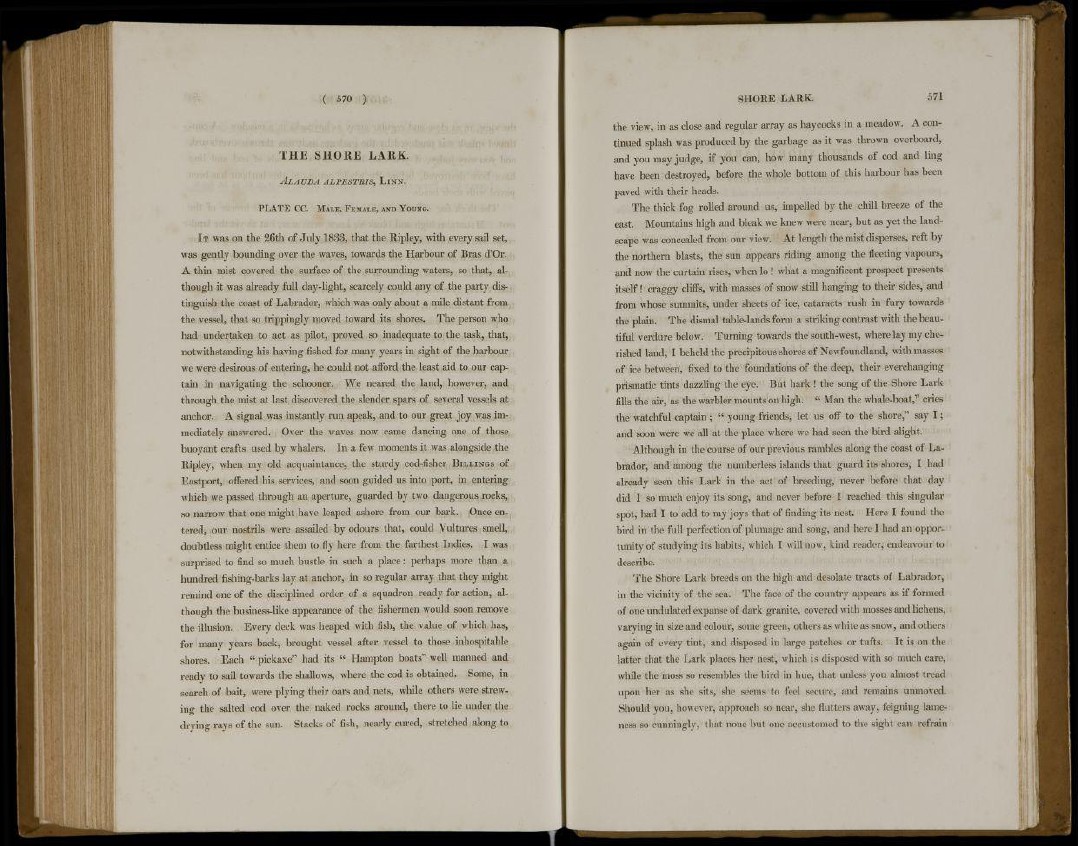
T H E S H O R E L A R K .
ALAUDA ALPESTBIS, LINN.
P L A T E CC. MALE, FEMALE, AND YOUNG.
I T was on the 26th of July 1833, that the Ripley, with every sail set,
was gently bounding over the waves, towards the Harbour of Bras d'Or.
A thin mist covered the surface of the surrounding waters, so that, although
it was already full day-light, scarcely could any of the party distinguish
the coast of Labrador, which was only about a mile distant from
the vessel, that so trippingly moved toward its shores. The person who
had undertaken to act as pilot, proved so inadequate to the task, that,
notwithstanding his having fished for many years in sight of the harbour
we were desirous of entering, he could not afford the least aid to our captain
in navigating the schooner. We neared the land, however, and
through the mist at last discovered the slender spars of several vessels at
anchor. A signal was instantly run apeak, and to our great joy was immediately
answered. Over the waves now came dancing one of those
buoyant crafts used by whalers. In a few moments it was alongside the
Ripley, when my old acquaintance, the sturdy cod-fisher BILLINGS of
Eastport, offered his services, and soon guided us into port, in entering
which we passed through an aperture, guarded by two dangerous rocks,
so narrow that one might have leaped ashore from our bark. Once entered,
our nostrils were assailed by odours that, could Vultures smell,
doubtless might entice them to fly here from the farthest Indies. I was
surprised to find so much bustle in such a place: perhaps more than a
hundred fishing-barks lay at anchor, in so regular array that they might
remind one of the disciplined order of a squadron ready for action, although
the business-like appearance of the fishermen would soon remove
the illusion. Every deck was heaped with fish, the value of which has,
for many years back, brought vessel after vessel to those inhospitable
shores. Each " pickaxe'1 had its " Hampton boats" well maimed and
ready to sail towards the shallows, where the cod is obtained. Some, in
search of bait, were plying their oars and nets, while others were strewing
the salted cod over the naked rocks around, there to lie under the
drying rays of the sun. Stacks of fish, nearly cured, stretched along to
the view, in as close and regular array as haycocks in a meadow. A continued
splash was produced by the garbage as it was thrown overboard,
and you may judge, if you can, how many thousands of cod and ling
have been destroyed, before the whole bottom of this harbour has been
paved with their heads.
The thick fog rolled around us, impelled by the chill breeze of the
east. Mountains high and bleak we knew were near, but as yet the landscape
was concealed from our view. At length the mist disperses, reft by
the northern blasts, the sun appears riding among the fleeting vapours,
and now the curtain rises, when lo ! what a magnificent prospect presents
itself! craggy cliffs, with masses of snow still hanging to their sides, and
from whose summits, under sheets of ice, cataracts rush in fury towards
the plain. The dismal table-lands form a striking contrast with the beautiful
verdure below. Turning towards the south-west, where lay my cherished
land, I beheld the precipitous shores of Newfoundland, with masses
of ice between, fixed to the foundations of the deep, their everchanging
prismatic tints dazzling the eye. But hark ! the song of the Shore Lark
fills the air, as the warbler mounts on high. " Man the whale-boat," cries
the watchful captain ; " young friends, let us off to the shore,1' say I ;
and soon were we all at the place where we had seen the bird alight.
Although in the course of our previous rambles along the coast of Labrador,
and among the numberless islands that guard its shores, I had
already seen this Lark in the act of breeding, never before that day
did I so much enjoy its song, and never before I reached this singular
spot, had I to add to my joys that of finding its nest. Here I found the
bird in the full perfection of plumage and song, and here I had an opportunity
of studying its habits, which I will now, kind reader, endeavour to
describe.
The Shore Lark breeds on the high and desolate tracts of Labrador,
in the vicinity of the sea. The face of the country appears as if formed
of one undulated expanse of dark granite, covered with mosses and lichens,
varying in size and colour, some green, others as white as snow, and others
again of every tint, and disposed in large patches or tufts. It is on the
latter that the Lark places her nest, which is disposed with so much care,
while the moss so resembles the bird in hue, that unless you almost tread
upon her as she sits, she seems to feel secure, and remains unmoved.
Should you, however, approach so near, she flutters away, feigning lameness
so cunningly, that none but one accustomed to the sight can refrain